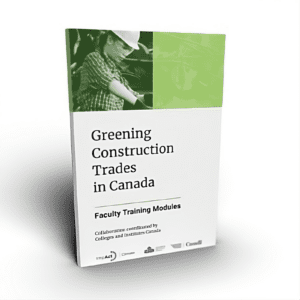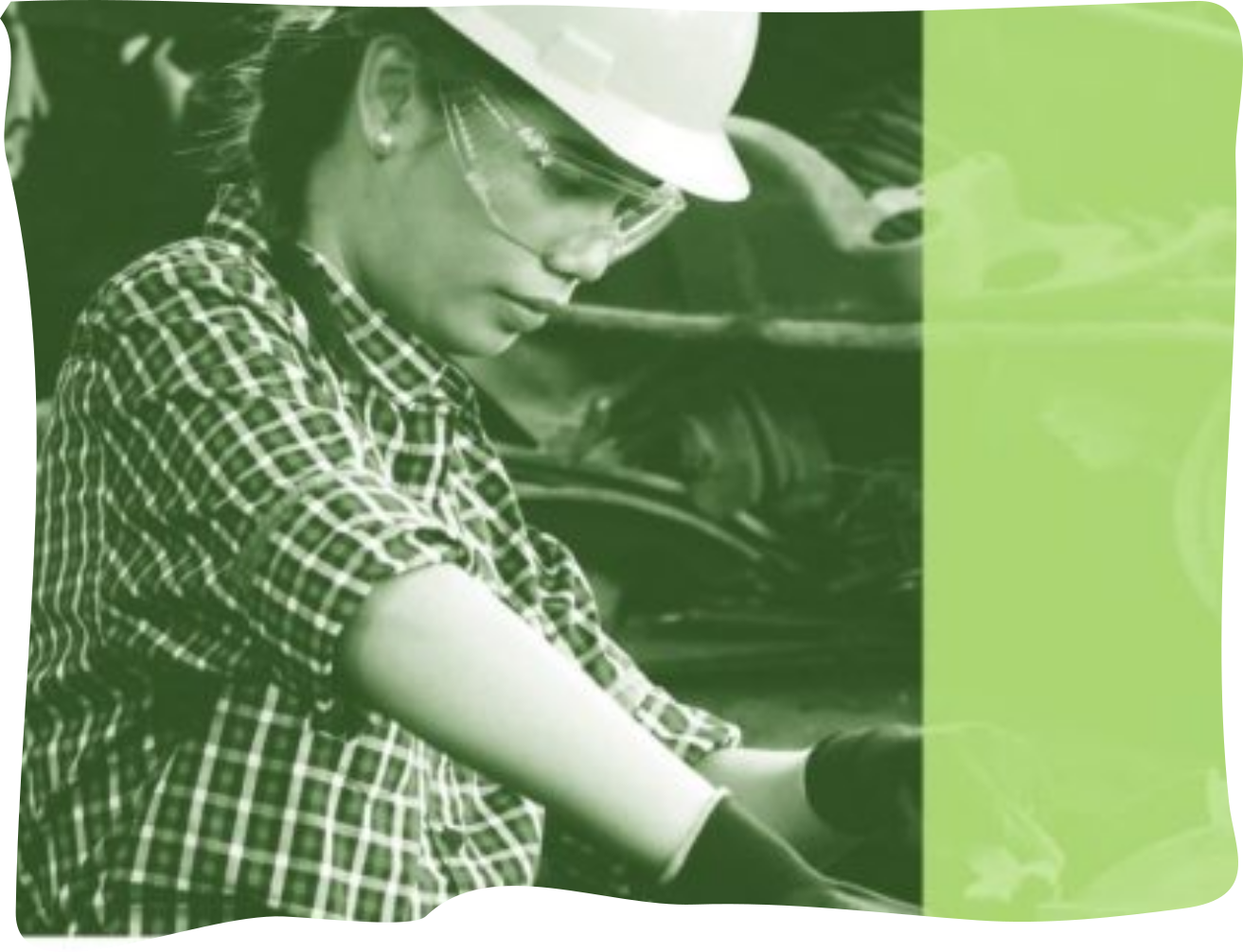
View the Open Educational Resource here
Greening Construction Trades in Canada addresses the integration of climate change awareness and Indigenous perspectives into the construction trades. This publication empowers instructors with innovative tools and knowledge to guide the construction sector towards Net Zero, focusing on sustainable practices and Indigenous ways of knowing to create a more informed and responsive industry.
Colleges and Institutes Canada (CICan) led the project and invited subject matter experts from institutes across Canada including Canadore College, Conestoga College, Red Deer Polytechnic, Sault College of Applied Arts and Technology, Selkirk College, and Vancouver Island University as well as a consultant on sustainability and climate change, Eco Canada and a consultant on incorporating Indigenous Ways of Knowing, Grey & Ivy, where I acted as the team lead.
Problem
The construction trades industry in Canada is undergoing significant transitions due to economic, environmental, and energy shifts. There is an increasing need to integrate sustainability and Indigenous perspectives into trades education to prepare both educators and students for a more equitable and sustainable future. However, systemic barriers—such as a lack of resources, resistance to change, and uncertainty around incorporating Indigenous Ways of Knowing—often prevent meaningful progress in these areas.
In response, Colleges and Institutes Canada launched the Greening Construction Trades in Canada – Faculty Training Modules project through their ImpAct Climate initiative. The goal was to create open educational resources (OER) that equip trades instructors with tools to integrate sustainability and Indigenous perspectives into trades education.
This involved creating transformative, inclusive modules that address systemic barriers, advance Truth and Reconciliation, and prepare educators and students for sustainable futures in four chosen trades: carpentry, electrical, landscaping, and HVACR.
The OER is to include:
- An introduction to sustainability and climate change
- An introduction to Indigenization and decolonization
- A faculty training module for each identified trade
Grey & Ivy, as a consultant to the project, was responsible for:
- Delivering presentations and workshops on Indigenizing and Decolonizing education and institutions
- Mentoring trades subject matter experts
- Reviewing faculty training modules
- Authoring introductions and supporting sections to the OER
As the project lead, I took on the majority of the work, including project management, and coordinating team members and Indigenous reviewers.
This project aims to empower instructors with the knowledge and tools needed to foster sustainability and Indigenous Ways of Knowing within their classrooms and workshops.
As a consultant with Grey & Ivy and the team lead on Indigenous content, I was responsible for mentoring subject matter experts, delivering workshops, reviewing faculty training modules, and authoring key supporting sections of the OER.
Action
The project spanned two years and involved collaboration between trades experts, climate specialists, and Indigenous knowledge holders. Development began with a series of online meetings and consultant presentations to introduce foundational concepts.
Grey & Ivy delivered three presentations, including:
- An introduction and history of Grey & Ivy, by the founder, Nate Kasten, with a focus on our approach to Design+Build and land-based education.
- Two-Eyed Seeing, Place-Based Knowledge, and Settler Colonialism, in collaboration with architect Shawn Bailey, who shared his experiences of Indigenizing Architecture and Engineering curricula at the University of Manitoba.
- Opportunities for Indigenous Ways of Knowing Through an Educational Designer’s Lens, which I led, exploring how content, metacognitive skill development, and pedagogy can allow space and integration for Indigenous perspectives and knowledges.
Development of each faculty training module began by each respective working group and I met with each group at least quarterly to offer support and guidance.
Personally, I found this work very difficult. First and foremost was the question of why was I doing this work as a European settler, why do I have this authority? I came to the conclusion that my immense amount of privilege should be used in efforts of what I believe in, in equity, in promoting Indigenous Ways of Knowing, in Truth and Reconciliation. In fact, inaction, or not doing work just perpetuates the status quo. I read a lot, much of which became the ‘Indigenizing and Decolonizing by Grey and Ivy – Complete Readings’ (https://pressbooks.pub/ftmcicanmodules/#toc-part-317 ) section of the OER. My perspective expanded from the need to have the answers into my role of opening the door for other perspectives, for understanding the past, for challenging norms, and for promoting methods of connecting with Indigenous Ways of Knowing.
I also authored Grey & Ivy’s ‘Introduction to Indigenizing and Decolonizing’ and coordinated an external Indigenous reviewer and implemented their feedback.
This collaborative process was not without challenges and the project took eight months longer than intended. Some working teams were reconstructed as subject matter experts could no longer participate in the project. The hardest topic to reconcile surrounded incorporating Indigenous Ways of Knowing. Some individuals struggled with Indigenizing and Decolonizing their work, while others believed that this project did not progress the topic far enough. While these discussions escalated and even threatened the entirety of the project, we continuously urged people to discuss and come to an acceptable agreement.
Results
The project delivered a set of educational resources that empower faculty to foster sustainability and Indigenous Ways of Knowing in trades education. These open-source modules address both technical skills and systemic barriers, promoting cultural understanding and environmental responsibility. Grey & Ivy’s contributions were instrumental in ensuring the project aligns with Truth and Reconciliation goals, preparing students and educators for the industry’s evolving needs.
External reviewers, including subject matter experts in each of the trades explored, sustainability and climate change, and Indigenous Ways of Knowing, reviewed the OER prior to public release. The sections by Grey & Ivy that I authored, the ‘Introduction to Indigenizing and Decolonizing’ and the ‘Indigenizing and Decolonizing by Grey and Ivy – Complete Readings’ received great reviews with minimal feedback.
Overall, the collaborative work culminated in a widely available resource that highlights the intersection of sustainability and cultural inclusivity, offering a pathway towards a more equitable future in the construction trades.
Learnings
This project reinforced the complexities of integrating Indigenous perspectives into mainstream education. Key insights include:
- Systemic change – Systemic change is very difficult to facilitate. There may be resistance at all levels of an institute, and true change can only occur when all levels truly embrace the practice of the continual process.
- The importance of iteration and dialogue – The process of incorporating Indigenous Knowledges and practices cannot be reduced to a checklist; it requires ongoing conversation, reflection, and adaptation. It is truly an ongoing process.
- Navigating discomfort and privilege – Recognizing my own positionality helped me shift from seeking definitive answers to facilitating space for multiple perspectives; to provide the opportunity.
- Conflict – Discomfort and controversy appears to be unavoidable when navigating such topics that involve equity, systemic change, trauma, or differing perspectives. While difficult, these conversations became some of the most meaningful work being done. Unfortunately, not all conflicts were reconciled and continuing to collaborate through differences proved to be challenging.
The Greening Construction Trades in Canada project underscores the importance of embedding equity and sustainability into education. By continuing this work, I hope to contribute to a learning landscape that empowers all participants to engage with complex, real-world challenges.
